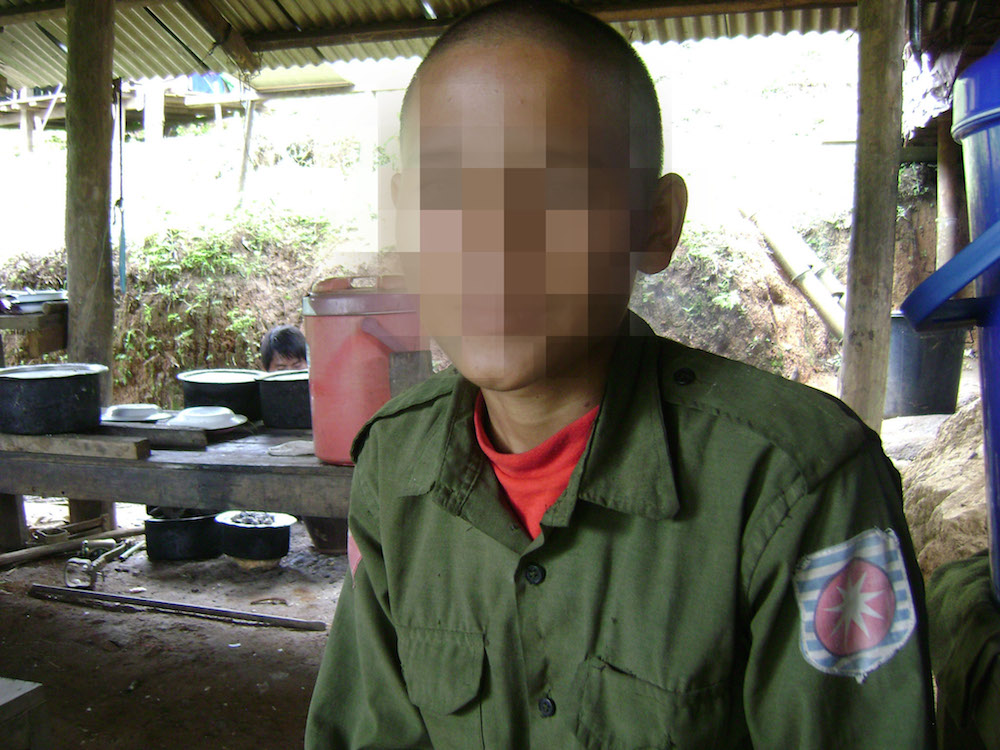Burma army still using child soldiers

There may be a new government in Burma, but it is army is still using force recruiting children into its army according to a child soldier who recently deserted to the Karen National Union.
Private Maung Ye Htet 17, no.T-438567 from Infantry Battalion 372 based at Maw Kee village in Myawaddy Township said he deserted to Karen National Liberation Army Battalion 201 on August 23.
Maung Ye Htet said that he had seen other child soldiers during his basic military training.
“I am the youngest in my battalion; others are all above 20 years of age. But when I was doing my basic military training, there were 252 people in our company and over 10 of them were child soldiers. They were all younger than me.”
Maung Ye Htet said that he had had enough of army life and the harsh punishment he received from his officers caused his desertion.
“I suffered from malaria and one of my legs was partially paralyzed. My officer, Captain Ye Lay Win, forced me to wear army boots. He allowed me three minutes to get ready but it took me five. He punished
me by ordering me to do back-flips. As my leg was partially paralyzed it was hard for me to do it. After that, I just ran away.”
Private Maung Ye Htet did not choose to join the army. He and one of his friends were taken by two soldiers at Yangon train station on May, 2010 and were sent to basic military training camp on June 16, 2010.
After serving in the army for over a year, Maung Ye Htet deserted his battalion without any weapon.
“I didn’t bring any weapon with me. I worry that if I bring it, they would chase me. I left with only my uniform and my long-gyi [sarong]. I never volunteer to join the army. There are many people in the army who want to run away.”
Maung Ye Htet was trained at Paung Gyi basic military training camp for four months before he was sent to join Infantry Brigade 372 in Anm Township in Arankan State for four months and then from there, his
battalion was sent to Karen state on 21st February this year.
Maung Ye Htet said that he also witnessed convicted porters in his troop.
“There were six convicted porters in our column. One of them escaped and another disappeared. There were many convicted porters with other columns.”
Maung Ye Htet explained what he did in the army, he tried to recall by counting the different chores he was given, but gave up and concluded that he had to do everything.
“I had to cut wood, bamboo, build huts and do everything I was asked to do.”
Maung Ye Htet said having children in the army is not right.
“Children shouldn’t be in the army because they can’t be with their parents. They are far away from their parents. They don’t have enough education and they are not given leave days.”
Maung Ye Htet said he was not old enough to vote in the national Burma elections in November 2010, but said he was not the only one. He said legal age soldiers in his battalion did not vote because their commanders voted for them all.
The United Nations in May this year named armed groups and governments that still used children in its army.
The UN report noted that most cases of recruitment of children were aged between 15 to 17, and the majority of those from Yangon division. The reported noted that children “continue to be persuaded or duped” by police, brokers, or soldiers who hope to be rewarded.
The Secretary-General’s 10th Annual Report on Children and Armed Conflict stated that, the Karen National Liberation Army and the Karenni army have developed an action plan with the United Nations in
keeping with relevant Security Council resolutions. The world body said it has been prevented from doing so by the Burma government – one of the world’s largest users of child soldiers.
David Thakapaw, vice chairman of the Karen National Union told Karen News that the KNU had instructed their armed wing, the Karen National Liberation Army, to ban the use of child soldier since 2003.
“The KNU has not only banned the use of child soldiers, under the age of 18, but has also strengthened the ban by instructing all KNLA officers at all levels to follow the KNU directive precisely and to verify and enforce the ban.”
Mr Thakapaw said KNU supported the UN position on exposing countries and the effort to eradicate such practices.
“Earlier, there had been children under the age of 18 joining the KNLA but it was on their own free will and we mainly had sent them to school for their further education.”
Major Saw Hla Ngwe, Karen National Union, joint secretary 1, said his organization, in consultation with young deserters will arrange a process that is in the best interest of deserting child soldiers.




